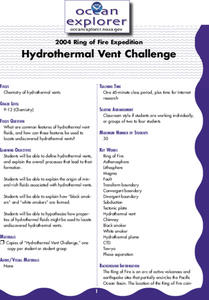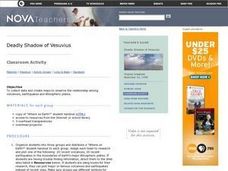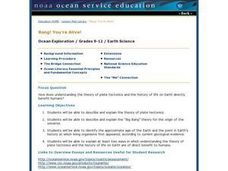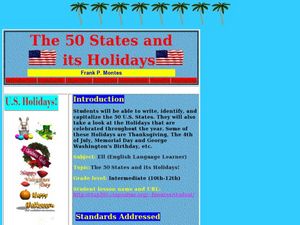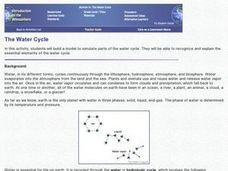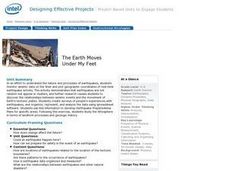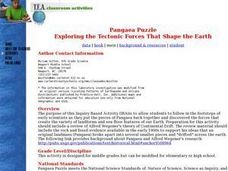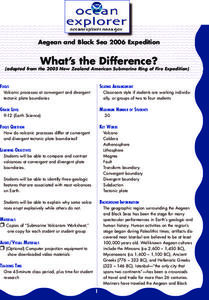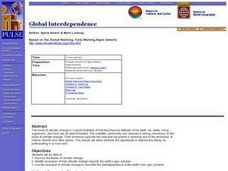Curated OER
Gallery Walk Questions about Energy and Material Cycles
Students state the physical, chemical or biological processes associated with these environments: Pelagic ocean zone, California coat Cave, Indiana Barrier island beach, North Carolina Sand dune, Dunes National Park, Colorado Wetland and...
Curated OER
Cruising the Mantle
Students explore the plate boundaries of the earth. Through the use of video, internet and hands-on activities, students examine the types of plate boundaries. They create a model to illustrate the movement and interaction of the...
Curated OER
The Volcano Factory
Learners examine the process of tectonic plates and why the Mariana Arc is active with volcanoes. They create a model of the Mariana Arc out of clay.
Curated OER
Hydrothermal Vent Challenge
Students discover common features of hydrothermal vent fluids. They use this knowledge to locate possible undiscovered hydrothermal vents on the ocean floor.
Curated OER
Friendly Volcanoes
Students discuss the benefits of volcanic activity on marine life. They explain the process of tectonic plates.
Curated OER
Planet Earth in Cross Section
Students will examine the layers of the Earth. In this geology lesson, students create a scale model of the Earth's interior using cash register tape. They will determine the percentage of error in the scale compared to the actual size...
Curated OER
2005 Submarine Ring of Fire Expedition: Unexplored
Students compare and contrast submarine volcanoes at convergent and divergent plate boundaries, infer kinds of living organisms that may be found around hydrothermal vents, and describe ways in which scientists may prepare to explore...
Curated OER
It's Going to Blow Up!
Young scholars discover the major characteristics of volcanoes on the Pacific Ring of Fire. They describe the processes that produce the "Submarine Ring of Fire." students explain the factors that contribute to explosive volcanic eruptions.
Curated OER
Deadly Shadow of Vesuvius
Students view a video clip about volcanoes. They collect data and create maps to see the relationship between volcanoes, earthquakes and plates. They share their maps with the class.
Curated OER
High Up in the Himalayas
Have your class supplement their knowledge on the Himalaya mountain range. In a brief handout, they read about the land masses that collided to form the Himalayas and other mountain ranges. It also touches briefly on the Earth's...
Curated OER
Slinky Lab- Simulating the Motion of Earthquake Waves
Sixth graders simulate primary and secondary waves. For this earthquakes waves lesson, 6th graders experiment using a slinky to gain understanding of how waves are created during an earthquake. Students record observations in drawings....
Curated OER
Bang! You're Alive
High schoolers explore the Big Bang Theory and the Theory of Plate Tectonics. In this history of life lesson, students explain two ways the Theory of Plate Tectonics and the Big Bang are of direct benefits to humans.
Curated OER
The Gifts of the Nile
Get your class thinking about the geography that shaped the Egyptian landscape and culture. They compare ancient climate zones and geogrpahical fetures, locate evidence of plate tectonics, take and quiz, and write a short essay. The...
Curated OER
Building a Better Sentence
Sentence construction is both a science and an art. This bare bones lesson ties an analysis of earth's geology to sentence formation. Although referenced as a major part of the activity, there are no links to the technology or resources...
Curated OER
The 50 States and its Holidays
Though the format of this ELL lesson is confusing (the standards listed are for plate tectonics, yet the objectives are for American geography and holidays), a teacher could glean some ideas from the main idea. Here, pupils complete a...
Curated OER
The Water Cycle--Model Simulation
Students build a model to simulate parts of the water cycle. They recognize and explain the essential elements of the water cycle.
Curated OER
WEAVING TECHNOLOGY INTO THEMATIC UNITS T.O.O.L.S. 2000
Third graders utilize computers and other technology to explain the solar system. Ten different stations involve students through laserdisc, research, art, GeoSafari, space toys, and the computer.
Curated OER
The Earth Moves Under My Feet
Students study earthquakes, monitor seismic activity using the Web, and plot real-time activity. They examine movement of the Earth's tectonic plates. They create an earthquake preparedness project.
Curated OER
Pangaea Puzzle: Exploring the Tectonic Forces That Shape the Earth
Sixth graders follow in the footsteps of early scientists as they put the pieces of Pangaea back together and discovered the forces that create the variety of landforms and sea-floor features of our Earth.
Curated OER
What's the Difference?
Students investigate volcanic processes at convergent and divergent
tectonic plate boundaries. They read and analyze diagrams, complete a worksheet, and write an essay.
Curated OER
Earthquake Epicenter
Students use chart data to determine the location of the epicenter of an earthquake. This task assesses students' abilities to generalize and infer, organize data, interpret data, and apply mathematical concepts.
Curated OER
Using Venn Diagrams to Compare Two Ecosystems
Students explore the distribution of two ecosystems on a global scale; and map the distribution of tropical and temperate rain forests throughout the world. They use a Venn Diagram to describe these ecosystems and the differences between...
Curated OER
Cherishing the Water of Life
Students work in small groups to brainstorm a list of all creatures, plants, natural, and artificial processes that use or depend on fresh water. The class views an aquarium filled with water representing all the water in the world. The...
Curated OER
World Geography: Global Interdependence
Students are able to discuss the theory of climate change. They identify examples of how climate change impacts the earth's geo-spheres. Students are able to use the example of climate change to describe the interdependence of the...





